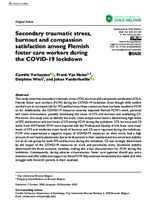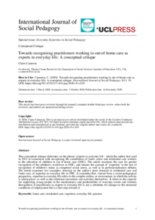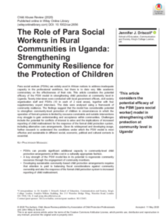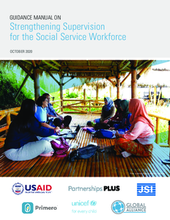Displaying 111 - 120 of 505
This study examines secondary traumatic stress (STS), burnout and compassion satisfaction (CS) in Flemish foster care workers (FCW) during the COVID-19 lockdown.
This article explores the risk of significant shared traumatic stress among public child welfare (PCW) workers.
The overall aim of the training programme is t
The objectives of this study include exploring the prevalence of three types of client-perpetrated violence (CPV) and the influence of each type of CPV on mental health outcomes of workers.
Child Welfare: Preparing Social Workers for Practice in the Field is a comprehensive text for child welfare courses taught from a social work perspective. This textbook provides a single source for all material necessary for a contextual child welfare course.
This article examines the case for greater recognition of the children’s workforce in out-of-home care (OHC), and situates the concept of ‘expertise’ in the rise of recognition of children’s status as competent social actors, as well as in professionalisation debates.
For this study, an exploratory theoretical thematic analysis of the narratives of residential childcare workers in child welfare (RCWs) was performed to further understanding about the nature of the psychological distress reported by RCWs.
This article considers the potential efficacy of the para social workers (PSW) model in strengthening child protection at community level in Uganda.
The purpose of this manual is to offer guidance on supervision to individuals working to provide, manage or coordinate social services. This manual defines what is meant by supervision in social services, outlines the key elements of good practice in supervision and summarizes the different forms of supervision.
This webinar outlined key elements of good practice in supervision and tools that can be used for achieving quality supervision for social service workers.




